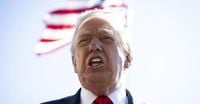In a move that sent ripples through diplomatic circles across Europe, U.S. President Donald Trump on October 9, 2025, publicly floated the idea that Spain could be expelled from the North Atlantic Treaty Organization (NATO) due to its reluctance to meet newly established defense spending targets. The provocative remarks, delivered during an Oval Office meeting with Finnish President Alexander Stubb, have reignited longstanding debates about burden-sharing within the alliance and the limits of presidential power in NATO’s consensus-driven structure.
"You people are gonna have to start speaking to Spain," Trump told Stubb and reporters, according to AnewZ. "You have to call them and find why are they a laggard. They have no excuse not to do this, but that's alright. Maybe you should throw 'em out of NATO frankly." The president’s tone was direct—some would say combative—and he was unambiguous about his frustration with Madrid’s defense budget.
At the heart of the controversy is a new agreement, reached at the NATO summit in The Hague in June 2025, that calls for all 32 member states to ramp up their defense spending to 5% of gross domestic product (GDP) by 2035. This is a dramatic increase from the previous 2% target set in 2014, a threshold many members—including Spain—had already struggled to meet. Of the 5% goal, 3.5% is earmarked for core military expenditures such as tanks, missiles, and ammunition, while the remaining 1.5% is intended for broader security needs, including infrastructure and cybersecurity.
Spain, under Prime Minister Pedro Sánchez, has been the most vocal opponent of this new requirement. Sánchez, a leader who has made defending Spain’s welfare state and championing the recognition of Palestine central to his foreign policy, argued that committing 5% of GDP to defense is simply "incompatible with our welfare state and our world vision." He further explained that reaching the new threshold would necessitate deep cuts to health care and education—an outcome his government is unwilling to accept. In a letter to NATO Secretary General Mark Rutte, Sánchez described the 5% target as "counterproductive for economic reasons."
Despite the pressure, Spain has managed to increase its defense spending considerably in recent years. According to figures published by NATO and cited by ARA, Spain’s defense budget jumped by 43.1% over the past year, from €22.693 billion in 2024 to €33.123 billion in 2025, bringing its defense spending to 2% of GDP for the first time—finally meeting the previous NATO goal. However, at the June summit, Sánchez made clear that Spain would only commit to 2.1% of GDP, not the 5% demanded by Trump and other allies. This stance left Spain isolated at the summit, with Sánchez appearing alone in the family photo, a visual symbol of Madrid’s resistance to what the Spanish government has called "abusive demands."
Trump’s reaction was swift and public. Not only did he suggest expelling Spain from NATO, but he also threatened to double tariffs on Spanish goods entering the U.S., escalating the dispute into the economic arena. This isn’t the first time the Trump administration has used trade as leverage; during a meeting in April 2025 between Spain’s Economy Minister Carlos Cuerpo and U.S. Treasury Secretary Scott Bessent, the White House had already pressed for greater Spanish defense contributions amid a broader tariff standoff.
For Trump, the issue is not just about numbers—it’s about alliance solidarity and deterrence. He’s repeatedly warned that the U.S. might reconsider its commitment to defend European allies who don’t pull their weight financially. "We have a lot of troops in Europe, as you know—a lot—and we can move them around a little bit, but no, basically we’ll be pretty much set," he said, signaling that, for now, the American military presence on the continent would remain steady. Yet the warning was clear: the era of free-riding, in Trump’s view, is over.
Spain, for its part, has pushed back strongly against the suggestion that it is shirking its responsibilities. In a statement released on October 9, the Spanish government asserted, "Spain is a member of NATO in full right and is committed to NATO. It fulfills its targets just as the U.S. does." Spanish officials have repeatedly pointed out that, while their defense spending lags behind the new target, the country’s strategic value to NATO is significant. Spain hosts two key military bases used by U.S. forces, and its geography is vital for defending the alliance’s southern flank. As National Post noted, "Spain’s geography plays an important role in defending the alliance and the country has two key military bases that host U.S. forces."
But can a country actually be expelled from NATO? The answer is complicated. While Trump’s rhetoric is forceful, the North Atlantic Treaty contains no formal mechanism for expulsion. Major decisions, including the hypothetical removal of a member, require unanimous consent from all 32 allies. As National Post reported, "There is no formal mechanism to expel members from NATO; all 32 members must agree on major decisions." In practice, this makes expulsion nearly impossible without overwhelming consensus—something that, so far, does not exist.
The episode is the latest in a series of high-stakes confrontations over defense spending that have defined Trump’s approach to NATO. During his first term and again since returning to office, Trump has made it a central theme to demand more from European allies. His efforts have yielded some results: defense budgets across Europe have risen, and the alliance has expanded, most notably with Finland joining in 2023 following Russia’s invasion of Ukraine. Still, the push for a 5% threshold marks a new high-water mark in the ongoing debate over who pays for Europe’s security.
Meanwhile, the broader context is not lost on observers. The war in Ukraine has underscored the need for robust collective defense, and NATO’s unity has been tested repeatedly. While Trump hinted at the possibility of new sanctions on Russia—"I might," he said when asked about further measures—he dismissed the idea of withdrawing U.S. forces from Europe, at least for now. The message was unmistakable: America expects more from its allies, but it is not yet ready to abandon the alliance.
As the dust settles, Spain finds itself at a crossroads, caught between domestic priorities and the demands of an increasingly assertive U.S. president. For NATO, the episode is a reminder that unity is as much about politics and perception as it is about budgets and tanks. The alliance may not be on the verge of losing a member, but the debate over how much each country should contribute—and what happens when they don’t—is far from over.


